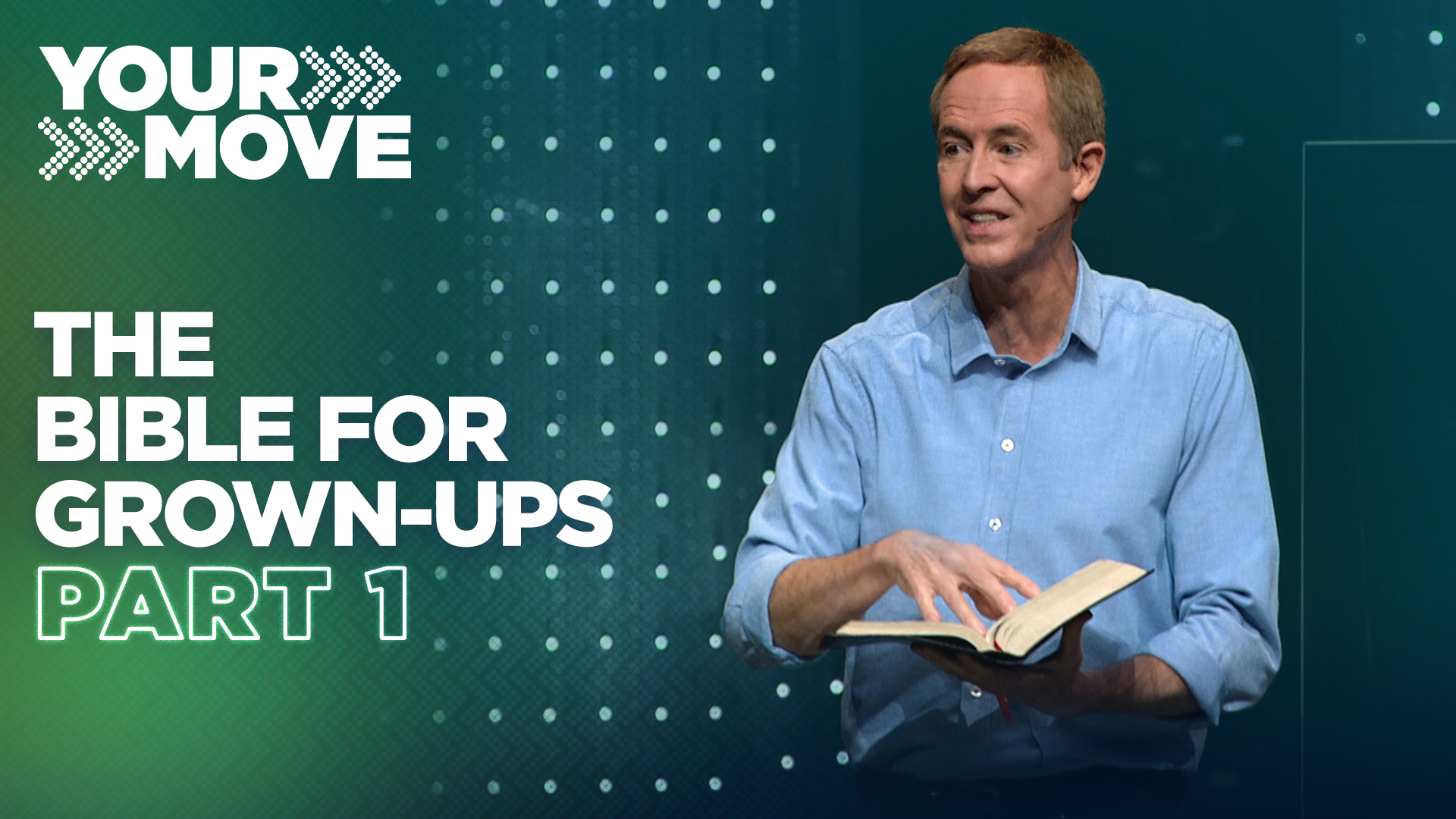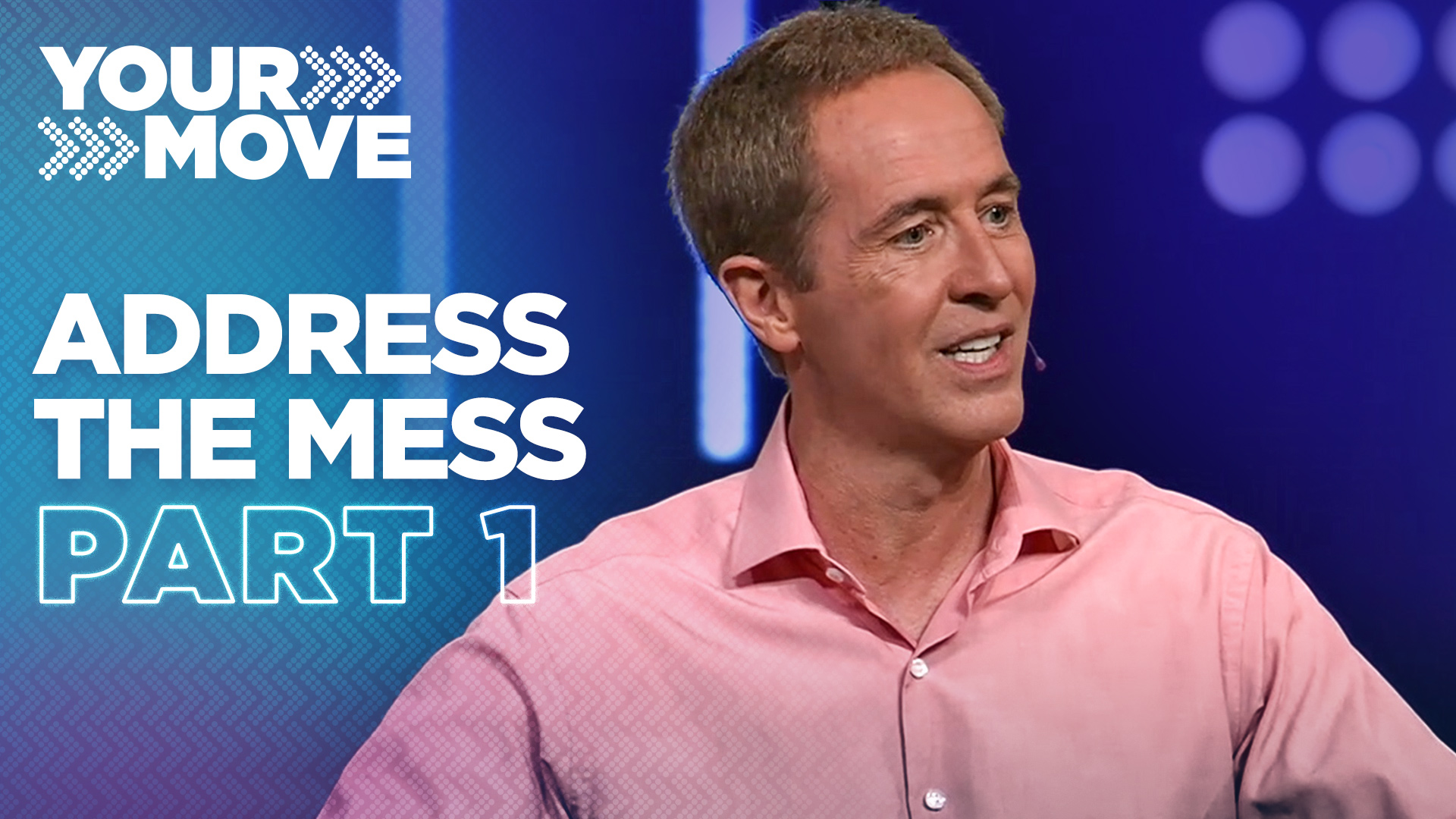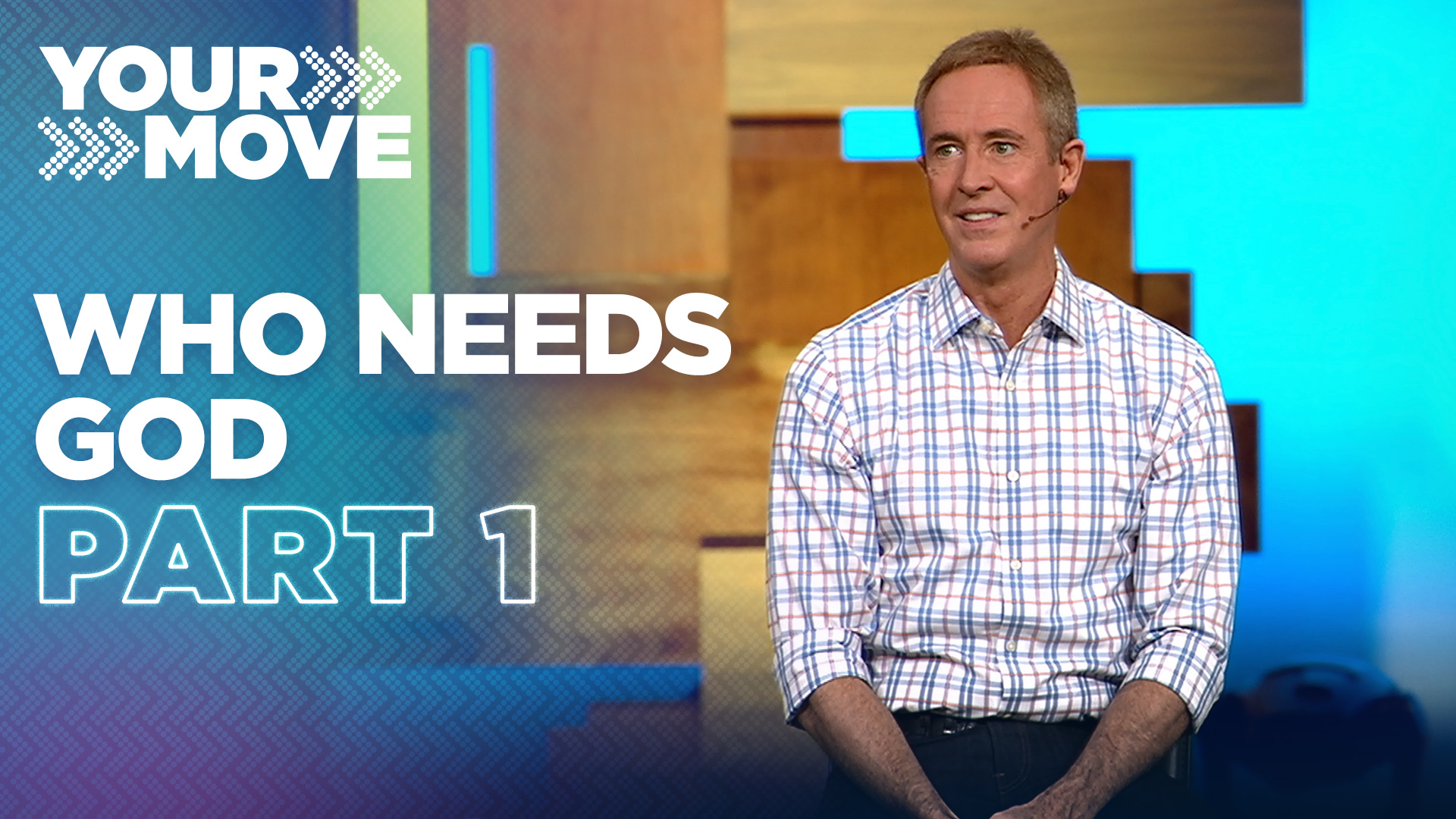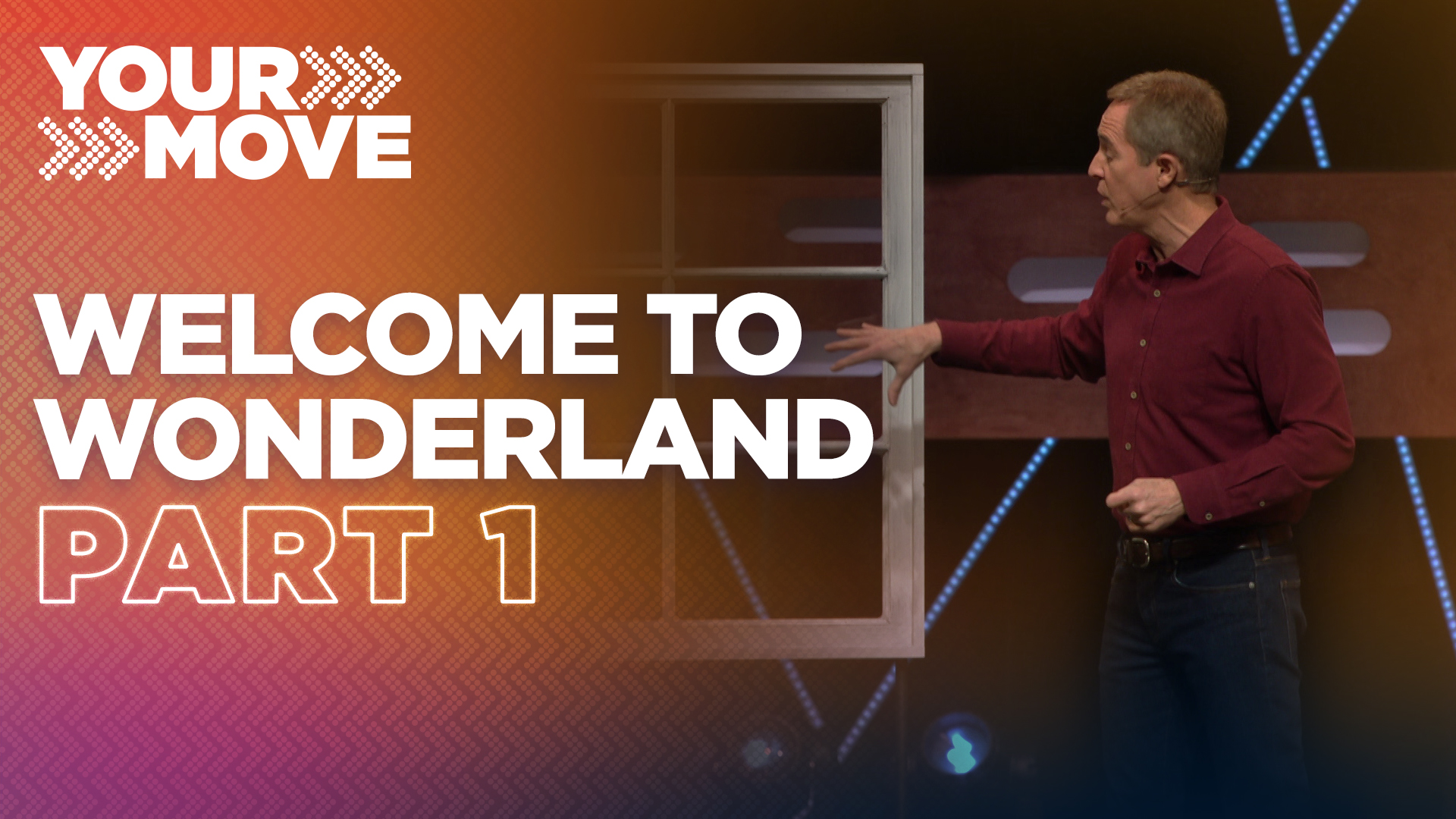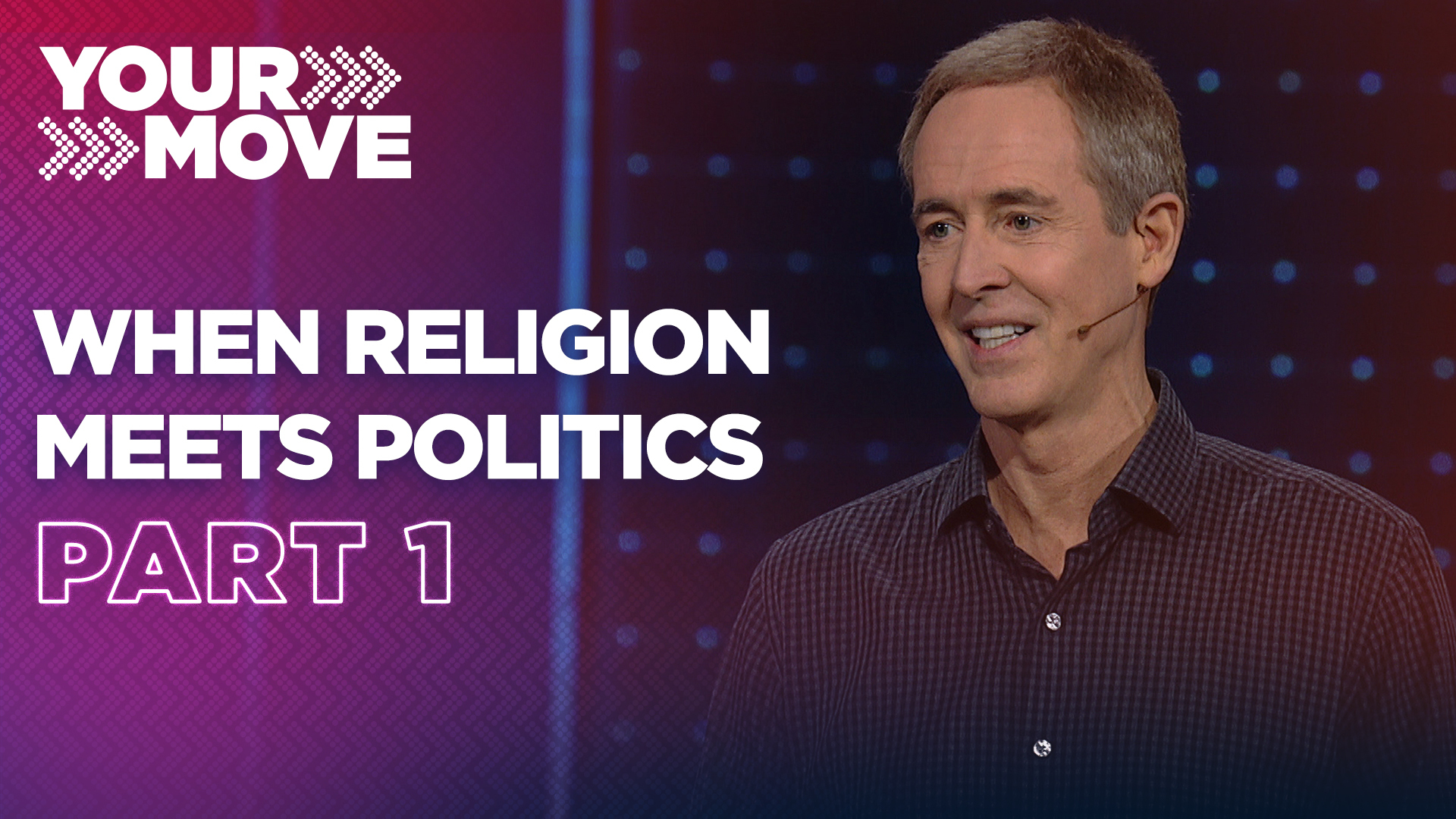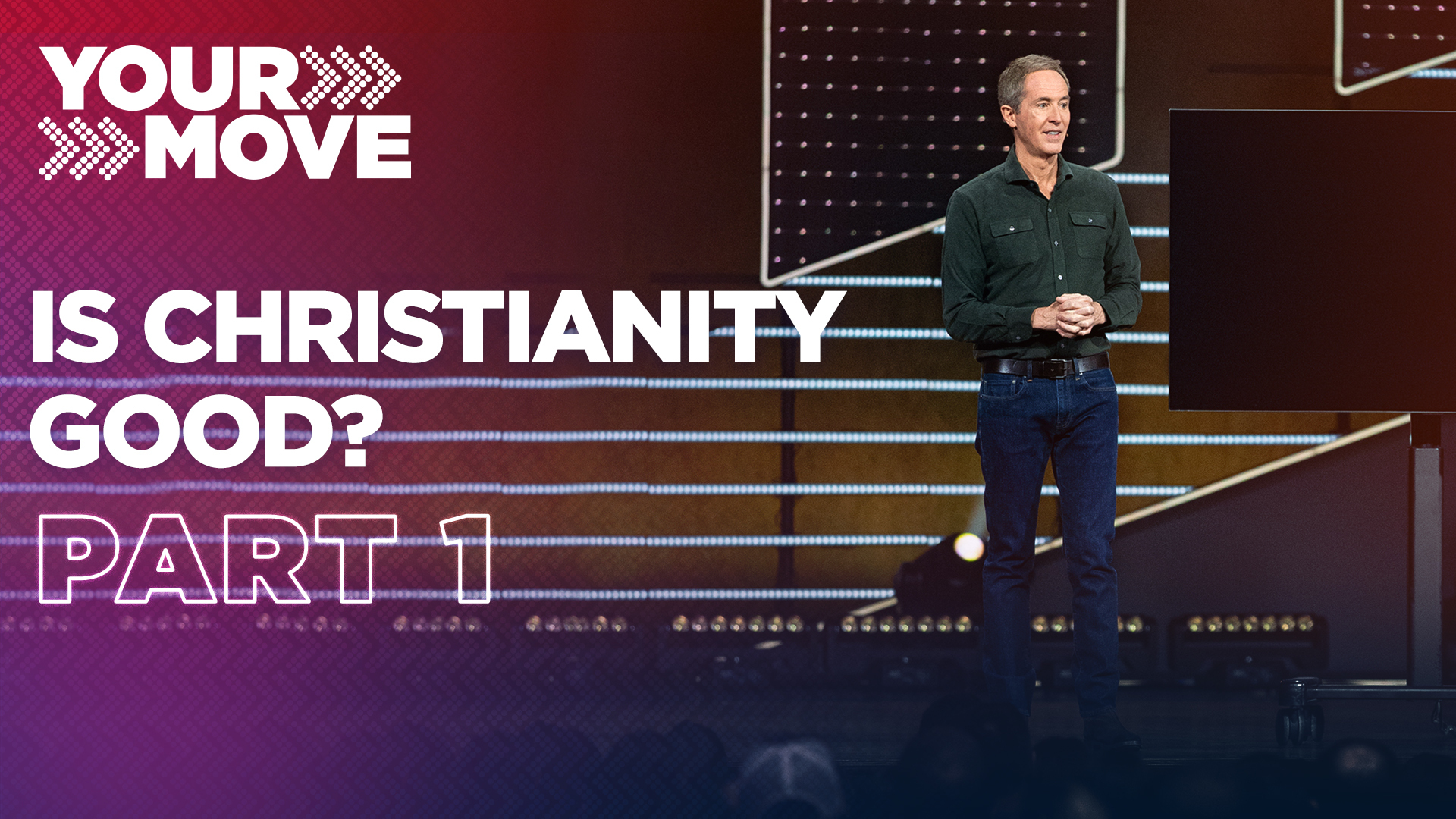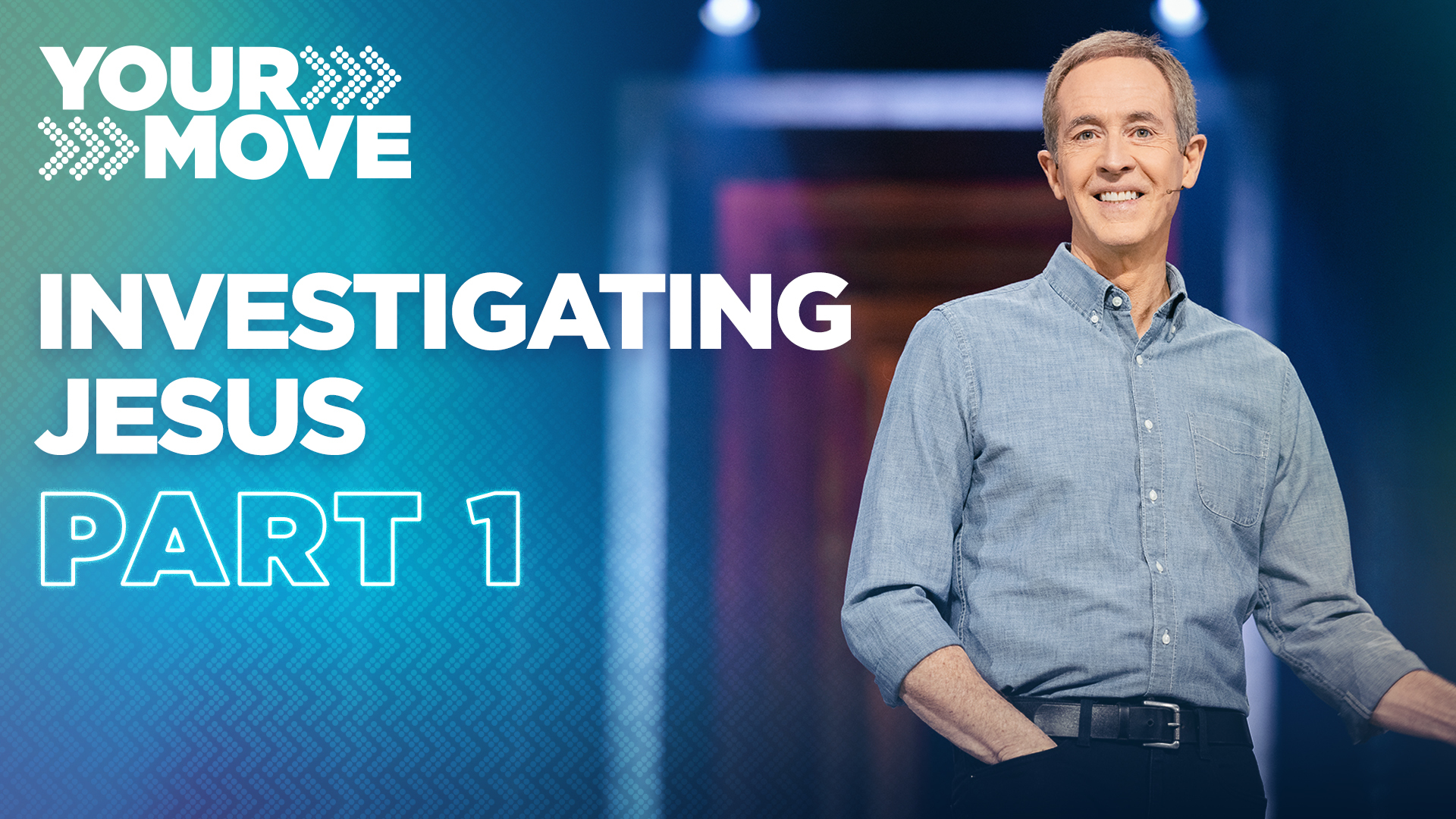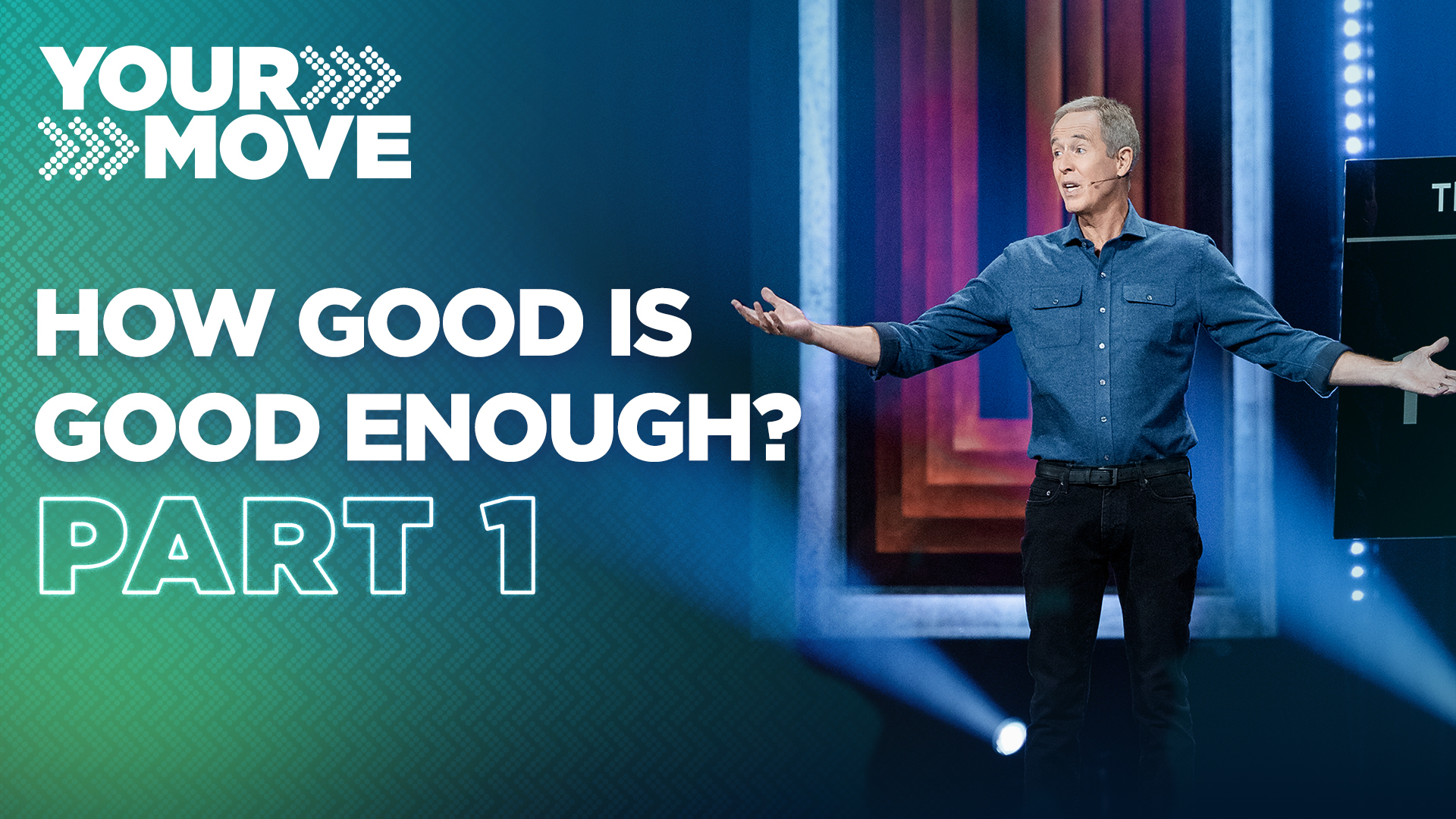Oftentimes we are told to fight temptation because we are tempted by things that won’t be good for us: another piece of cake, that late-night text. But there is one temptation we should lean into, and when we do, the world changes for the better.
NOTE: The following content is a raw transcript and has not been edited for grammar, punctuation, or word usage.
So I wanna begin today with something that’s common to all of us. This is, actually, something that we all, and this is gonna be kind of a strange way to start. Something that we all have in common, not just with each other. This is something we all have in common with God. And we don’t have much in common with God, but this is one thing that we all have in common with God. And if you don’t believe in God, you might be shocked that Christians believe this is true of God because, in your experience with Christians, maybe you don’t necessarily think this is true of us. But this is true of all of us, whether you believe in God or not. So this is something we all have in common with each other and with God.God resists the proud.
Isn’t that true? They’re proud or like the arrogant people, the people who are never wrong. They’re never wrong. No matter what you say and how you confront them, they’re never wrong. You’re the one that’s always wrong Okay, Peter, who wrote this, Peter, who knew Jesus, Peter, who’s Like one of the first people Jesus called to follow him, famous Peter. He Is who wrote this, and he wrote this many years after the resurrection of Jesus. And this is what else he says, because this is something else we can all agree with. God resisted The proud, but he shows favor to the humble.
I’m like, “Me too.” So this is something we have in common with each other, for the most part. And according to Peter, and according to the New Testament, according to Jesus, God, our heavenly Father, is the same way. Which brings us kind of through the topic of the thing we’re gonna talk about today. Is this word humble or humility.
Humility. We all know this. We’ve experienced it is so powerful. In fact, if you’re having a conflict with someone, whether it’s family or work or neighborhood or whatever it might be, when you’re having a conflict with someone, and you’re coming… You’re gonna… You’re coming in hot, like you got your thing all lined up, and you’ve had this imaginary conversation 20 times, you know what you’re gonna say, and you’re gonna show ’em you’re wrong. I mean that they’re wrong. And you’re right. And you come in hot when you, when in a difficult conversation or difficult environment, when you bump into humility, it’s so off-putting. It just puts you off balance because you’re expecting them to be defensive, and they’re not defensive. You’re expecting pushback. And the thing is about humility. Humility doesn’t push back. Humility absorbs. And sometimes you don’t even know what to do with it.
It’s so powerful. And when two people, when humility meets humility, just about anything can be resolved. And this isn’t new information. You don’t need to write this down. We know this. So I wanna ask you just the strangest question, okay. There’s no good answer to this ’cause it’s not even a good question. But to kind of get us on the same page of where we’re going today. Are you ever tempted by humility? You know what it means to be tempted. Right? Something that appeals to a desire. Are you ever tempted by humility? How about this? Are you ever tempted to be humble? No.[laughter] It’s, we don’t think of this as a temptation. Are you ever tempted to be humble, but you resist? “I rebuke you humility. I will not give in to you. You shall not pass.” Do we ever have that internal conversation with humility? No, because humility isn’t really a temptation we resist, but it’s definitely a posture that we should all adopt. After all, we like it when we see it. We like it when we’re confronted with it. So why would we not pursue it? So for the past two times we were together, I gave you an assignment, and I promise I’m gonna give you a different assignment.
I’m not gonna leave you with this one, but I wanted you to sit in this a little bit, and I’ve gotten some really interesting feedback for those of you who’ve really attempted this or thought about this. I ask you to during the week, that when you find yourself in conflict with somebody, whenever there’s tension in a relationship at home or at work or school or wherever you are, to at least ask yourself, ask yourself whether you act on it or not. What would choosing to lose look like in this situation? What would it look like if somehow I figured out, how can I lose in this discussion? How can I lose in this discussion? How can I lose in this argument? What would it look like to let somebody else go first, even though I got here first? What would it look like to let somebody take the idea, even though it was my idea? What would it look like to let somebody else pull ahead and get the credit to have their way? What would that look like?
So we’ve been sitting in that for a couple of weeks, I hope so, moving on. It’s interesting, and I don’t know why this is the case and nobody really knows, but the only miracle of Jesus that Jesus performed, the only miracle that Jesus performed, that’s recorded for us in all four gospels, Matthew, Mark, Luke, and John, is the feeding of the 5,000 or the feeding of the multitude, as some Bibles refer to it.
So the feeding of the 5,000, which was a spectacular, very public miracle, right? This wasn’t done in the dark of night. We’re healing somebody and can you prove it? I mean, out in the open all these people are fed. And what happens right after Jesus feeds this multitude of people, these 5,000 men plus women and children, what happens right after it is not miraculous, but it’s extremely instructive as we think about the way of the cross. Because right after Jesus feeds this multitude of people, he is offered once again a crown. He’s offered, once again, a kingdom. He’s tempted maybe, or at least he’s certainly offered the opportunity to become the King of Israel. So here’s how it happened. John the Baptist had just been beheaded. John the Baptist is a folk hero during that time in Judea, but especially in Galilee.
People, all the masses, the normal people loved John the Baptist because he called out the corruption in the temple. He called out the corruption of the politicians. He was fearless. He did not care what anybody thought about him. He just said it like it was, and it got on Herod’s nerve because it got personal for Herod. So Herod has John the Baptist arrested, and then he has John the Baptist beheaded. So there’s all this uproar in Galilee and Judea, and just so if you have a visual of the map, way up high is Sea of Galilee the Jordan River, Dead Sea, and over here is Jerusalem. So you got this sort of north south thing. So from Galilee to Judea, people are disturbed. And Passover is coming. It’s just a few weeks away. And during Passover In this region of the world, the nationalistic spirit, the patriotism of the people, it was at an all-time high because Passover was the celebration of God delivering the nation of Israel from Egyptian bondage and taking them to their land.
But now they’re in their land, and once again, they’re in bondage to Rome. So during Passover, I mean the, the whole sense of, “Hey, we need to throw off our oppressors.” It ran at an all-time high. Governor Pilate would triple the guard around the temple, send more shock troops into the city of Jerusalem during Passover. It was so extraordinarily tense. So Jesus, senses all this. And now that John the Baptist has been killed, I mean, it just heightens the emotion. And he knows now everybody is gonna look to him because John the Baptist said Jesus is the one, he’s the Messiah. He’s God’s final king. So Jesus does what Jesus does instead of heading to Jerusalem, he heads the other way. He goes north, he goes all the way to the Sea of Galilee, and the text says he went to a solitary place, he and his 12 apostles to get away from the crowd, but they spot him, and dozens come, and then hundreds come, and then thousands come. And he looks at this group of people and they’re like a flock of sheep, but they’re like a flock of sheep without a leader, without a shepherd.
He looks at this crowd, he has compassion on them and he begins healing. And the disciples are like, oh, you know, I thought we’re gonna get a break. So this goes on and on, maybe for two or three days. We don’t know. But on one particular day, they’ve been there. He’s healed all day long. The sun is setting and nobody’s leaving. They’re just staying. And you remember this part. So the disciples come to Jesus and they say, hey Jesus, look, send the crowds away.And here’s their cover for what they really want. Send the crowds away so they can go to the villages and buy themselves some food and we can get a break.
Send them away to buy some food because they’re gonna starve out here. They’ve been here all day and Jesus stares out at the crowd and he feels compassion. Then he smiles and I love this. And he turns to the apostles, his disciples, and he says, I got an idea. You give them something to eat. I Love this. And you know the story. And they did. They fed these thousands of people and the crowd goes wild. And for them it is not just a miracle. It’s a sign. A sign is something that points to something. In fact, all of Jesus’ miracles, they weren’t just standalone miracles. They were all signs pointing to something. And they realized this is a sign. The time has come John the Baptist was right. This is the prophet sent by God. He is the one. He just did what kings do. He fed his people. He’s the Messiah. And the text says this that after the people saw the sign that Jesus performed and they begin to say, surely this is the prophet who has come into the world. This is God’s final king. He is the Messiah. This is Jesus’ big moment because it’s a big crowd.
And the text is so specific. This is why the text says there were over 5,000 men. Why that number? Because 5,000 was the number of a Roman legion. This is the equivalent of a Roman legion. And they are way up north in Galilee. And if they decide to march on Jerusalem to make him king by the time they get from Galilee four or five days later all the way to the gates of Jerusalem they would have 20, 30, 40, maybe 50,000 men. So this whole thing turns political. And Jesus knowing that they intended to come and make him king by force. He knows what’s in their heart. And Matthew, who was there, says the most interesting thing at this point.
He uses this word, he says, immediately, immediately, immediately, Jesus says to his guys, come on, let’s go. Come on, follow me, we’re going. And they’re like, no, no, now we wanna stay. I mean, this is epic, this is gonna be amazing. And the text tells us that Jesus your King, with all that handed to him, all that available, I love this, withdrew again to a mountain by himself. Not because he didn’t deserve a crown and not because he wasn’t a king. He didn’t want that crown. He didn’t want to be that King. He didn’t want that kingdom. It wasn’t his way.
And that wasn’t the way he was gonna do it. So instead of marching on Jerusalem some days later Jesus and his apostles march to Jerusalem not to take life but to give his life away, modeling the way, the way of the cross. And when he gets there, he tries to kind of sneak in with the crowd and they’re not having it and they recognize him again. And then he buries himself in the depths of the city for a week. And he wants to celebrate a private Passover with his guys. And so, he secretly arranges where they’re gonna do Passover so they can just be away from the crowds. And the gospel, all the gospel writers tell us three of the gospel writers tell us that the Pharisees and the teachers of the law have spies out everywhere looking for this guy, looking for Jesus. And Jesus has this private room. And only a few people know where it is, it’s such an interesting detail.
Jesus works it out himself behind the scenes and he gathers the 12 and they have their final Passover together. And the apostles, we know what they’re thinking. They’re thinking, well, maybe this is it. We’re in the city. I mean, we’re here now. And they’ve just celebrated Passover. I mean all you gotta do is just a spark. It’s a powder keg waiting to happen.
And it gets lost on us that in this moment, after they celebrate the Passover meal, the next thing Jesus does, Jesus’ last act before he’s arrested, his last act before he’s arrested, is he washes his disciples, feet. Now, just to put this in perspective, (Sarah – I believe someone’s phone is ringing here) rabbis don’t wash anybody’s feet. In fact, rabbis wouldn’t even allow their disciples to wash their feet. The only people that washed feet were slaves, the lowest of the low. And Jesus works out this whole environment where there’s not anybody to wash feet on purpose. So when Jesus stands up and removes his rabbinical robe and lays it on a stool and then puts a towel around his waist, they’re all thinking, Uh-uh! No, no, no, no. We have seen what those hands can do, and you are not about to wash our dirty feet. And Peter says what the rest of them are thinking. And Jesus is like, “Peter, sit back down.” The pictures have everybody sitting at a table. That’s not the arrangement. The gospels are clear, they’re reclining. I don’t know how to describe this. I was gonna show you a picture, but doesn’t do it justice. So just imagine, you’re leaning on an elbow, you’re on your left elbow, you’re eating with your right hand. The person next to you is here. They’re kind of in your chest and somebody’s in there, and it goes all the way around the table. Everybody’s legs are extended behind them. They’re all facing each other, and Jesus is behind them.
They can all make eye contact with each other. Jesus is behind them. And this takes a lot of time. And during all of that time, look up here. Your Savior, is on his knees at the feet of men, who would abandon him, that very, night. One of them. Peter, would deny that he even knew who Jesus was. That very night or early that next morning, one of them had already betrayed him. Judas Iscariot was responsible for making sure Jesus was arrested that very night. And Jesus washed Judas’ feet. Let that sink in. This is the way of Jesus. This is the way of the cross. This is what eventually rocked an empire and shaped the world. When Jesus talked about enemy love, love your enemy. He was not kidding. That night, they didn’t know it. That night, He showed them how it was done.
And when that most humiliating moment of their life finally passed, Jesus stands up, puts his rabbinic robe back on, and he asks them this question and they knew better than to answer out loud. “Guys, do you understand what I have just done for you.” To which they’re thinking other than humiliate us completely? No. What have you done for us?He says, “You call me and rightly so, you call me teacher and you call me Lord, and you’re correct. That is what I am.” “Guys, I am a big deal. You are not wrong about that. You’ve seen what I’m capable of. You know what I can do. We were just in Bethany and I let Lazarus be dead for three and a half to four days so you guys would know who you’re dealing with.” “I am a big deal.” And what he knew that they didn’t know was in a few weeks, they were gonna be a big deal as well.
And here’s what I know about some of you. You’re a big deal. You are. People look to some of you, When you speak, people are a little bit quieter. People write down what you say, you’re a big deal. And Jesus says to this group, “Hey, you’re right. I’m a big deal. One day you’re gonna be a big deal.” Let’s talk about what all the big deals should do. Here’s what you do when you have a little extra authority, a little extra resource, a little extra power, a little extra influence. “Guys,” he says, “Do you know what I’ve just done for you?” You ready for this? Say something real quick, if you’re not a Jesus follower, you’re not a Christian. I’m so sorry. The church hasn’t gotten this consistently right?
He says, “I, the big deal. I have set for you an example that you should, think about, Nope. Write down, Nope. Agree with, nope. Consider, nope. That you should do as I have done.” And they don’t know it in the moment. He just washed Judas feet. That you should do as I have done, for you. That you should do for others. What I have done for you, which is what? Well, here’s what he did. Here’s what he did throughout his ministry. This is what it means to follow Jesus. This is what it means to get in sync with the way of the cross. He says, “I want you guys for the rest of your life.” And they did it. I want you guys for the rest of your life. And if he was here and he was looking at those of us who claim to be Christians, he would say, “And this is for you too.
Do you know what I’ve done for you? I want you for the rest of your life to choose.” Because it is always a choice. It is an invitation you do not have to accept it but I’m inviting you to accept it. And for the rest of your life, I want you to choose because it’s a choice. And I want you to chance because it is risky. And I want you to chase, I want you to be intentional. I want you to choose. I want you to chance, I want you to chase humility. I want you to give into the temptation to go second or last. Or maybe you just don’t even go at all. I want you to proactively every day in any and every environment, do for others. And this is for those of you who are a big deal, in my world, I’m a big deal. I’m the boss. My jokes are so funny.
Jesus says, okay, here’s what I want you to do. I want you to look for opportunity. Don’t wait for it to come along. I want you to proactively, I want you to do for others what others expect others to do for you. I want you to do for others, what those others expect some other people to do. I don’t want you to just do for others what you want done for you. I want you to do, actually do for others, what is generally done for you.
Now, there’s more. This is so amazing, to me this is the most amazing part. It’s so subtle. Jesus, when he washed their feet, look up here. He wasn’t just illustrating something. I’ve set for you an example, when he said, I’ve set for you an example. Okay? You illustrate. Jesus wasn’t simply illustrating something when he washed their feet. He was responding to something. Remember last time we talked about the fruit of the spirit and I said the fruit of the spirit, all these love, joy, peace, patience, kindness, goodness, general self-control, those are responses. You don’t get up in the morning and say, today I’m gonna be so patient.
No, you wait, and then you respond with patience, you respond with self-control. You respond with kindness. They’re responses, when Jesus got up to wash their feet, He wasn’t simply setting an example, He was responding to something. Here’s what Jesus told John later that John puts in his account of the gospel. This is amazing. This is in the upper room. Jesus knowing that the Father had given all things complete control, everything, as He would say later in His great commission, everything in heaven and on earth, Jesus recognizes that the Father had given all things into His hands and that he had come forth from God and was going back to God. This is so amazing. In that moment during Passover, Jesus is overwhelmed with some renewed or heightened sense of who He was, of the power He had. He was overwhelmed. He knew he had all the cards. It was like, in this moment, I’m just guessing a little bit ’cause that’s all we got to go on. It’s like in this moment he realized, His heavenly Father had said, “Son, they’re the keys. Hands off, all power in heaven and on earth it’s in your hands. Now what are you gonna do with it?”
What do you do when it dawns on you that you’re the most powerful person in the room? when you realize I got more resources and more influence than everybody else? What do you do in that moment? And this is so amazing, in (Sarah – when he says the word “in” there is an odd audio glitch here)that moment, John says, when it dawns on Jesus, or there’s this renewed realization of who he is and the power, and it says immediately, that’s when he got up from the supper and laid aside his garments and taking a towel. He girded himself and he washed their feet. His immediate, what if we lived like this? Imagine if this was the reputation of the Christian community. He immediate, his immediate response was to wash the feet of cowards, deniers and traitors. Jesus, you got all the power in the world. What are you gonna do? I’m gonna give it away. Hours later, they abandoned him. He’s arrested, he’s flogged.
And Jesus, Jesus, to whom all authority had been given, refused once again to leverage any of that power for his own sake, for his own benefit. He chose instead to leverage it for our sake. For your sake, by every human estimation as we said last time Jesus lost, but what they didn’t understand until after the resurrection, it wasn’t that Jesus was against winning. Jesus wasn’t against winning. He was just doing… He was just involved in an entirely different competition. He was competing for an entirely different prize. He was competing against pride. He was competing against arrogance. He was competing against self-sufficiency. and he had every right in the world as the son of God to claim it for himself. He said, no.
It’s not my way, and it’s not the way of my people, and it’s not the way of those who choose to follow me. He was competing for others. He was competing for you. Come on. His humility is what brought you your Salvation. He was competing for me and He won, and when He won [laughter], this is so always so emotional for me. When he won, His father stood and applauded, because as Paul would remind us later, Jesus, this is amazing. Jesus being in very nature, God never considered equality with God something to be used to his own advantage. He was a big deal. He just never acted like a big deal. He never played the God card. I’m God, I’ll have that, please. He never leveraged it for his own advantage. Imagine if we live like that. Rather, He went the opposite way, very proactive. Rather, he made himself nothing. He made himself a nobody. By taking the status and the role of a servant, wash their feet and being found, Paul says, and being found in appearance as a man. Here’s our word. He humbled himself. He chose it. He chased it. He lived it.
And to what degree did he humble himself for you and me? By becoming obedient to death, even death on a cross. Good news, you will never have to do this, I’m imagining. But if you’re wondering, how far do you go, how low do you go? That’s how far he went. That’s how low he went. He lived this out to the bitter, crucify him, crucify him. End so the cross became the icon for Christianity, for your faith and mine, because the King flipped the script. So I wanna leave you with a new question this week. What would it look like? What would it look like to chase humility? What would chasing humility look like for you? Look up here. Not simply responding humbly. That’s good. What does it look like to proactively chase humility like your savior instead of marching on Jerusalem ’cause you’re all powered up and bowed up and you’re right, and you’re the boss and you got the right argument and I’ve worked it all out. Instead of marching on Jerusalem to march to Jerusalem to give your life away, to lay down a little bit of your life for them, for her, from him, for that group.
In light of what’s happened in your community or maybe in your family, maybe with one of your kids. And I can’t answer this question for you, but here’s what I can almost guarantee you, if you’ll ask it, you’ll know. If you’ll allow yourself to be tempted by humility, you’ll see and perhaps you’ll be changed. And when the church, if the church ever rediscovers the way of the cross, perhaps the world could change once again. So choose it this week. Chance it. It’s risky. There’s not necessarily a bow. Chase it like your savior because that is the way, it’s the way of the cross.



